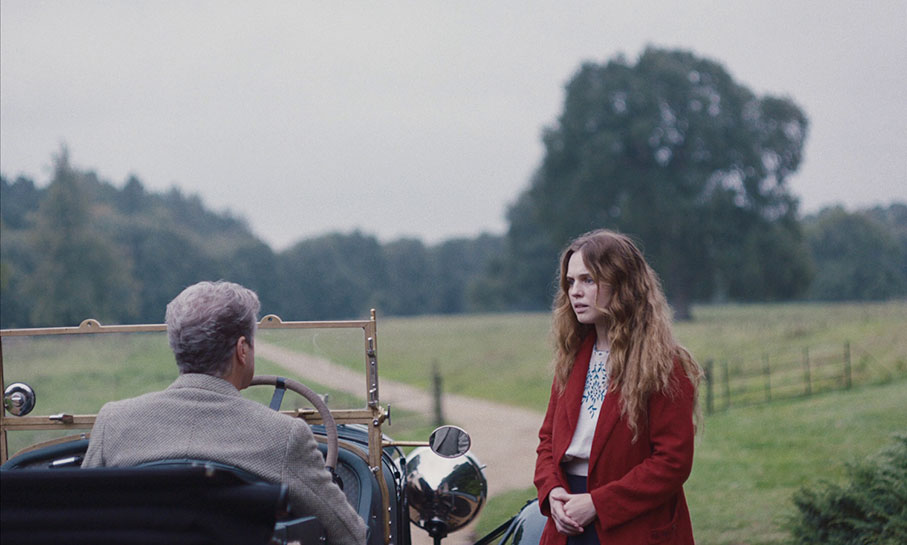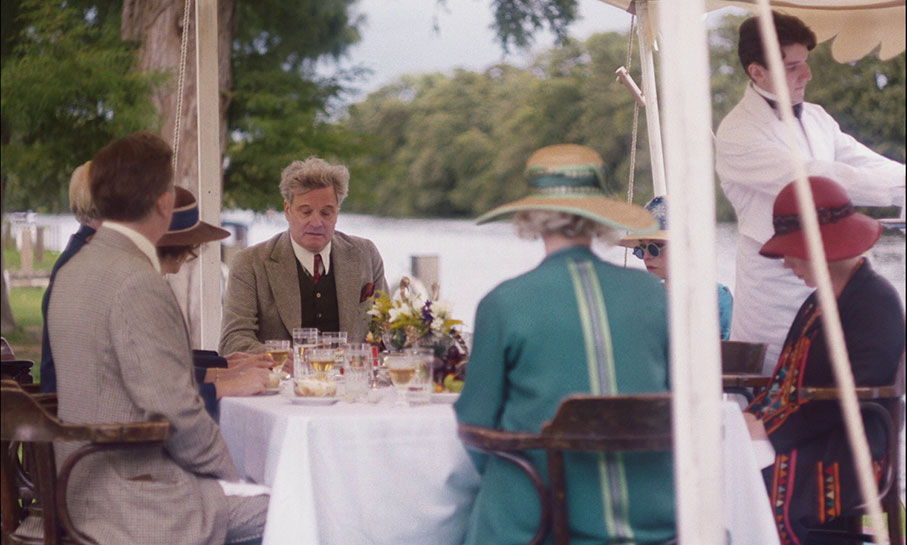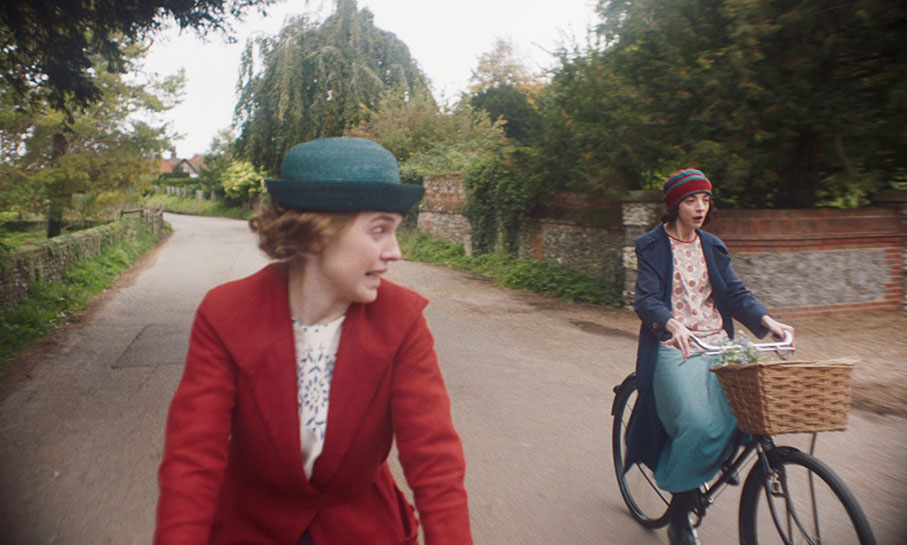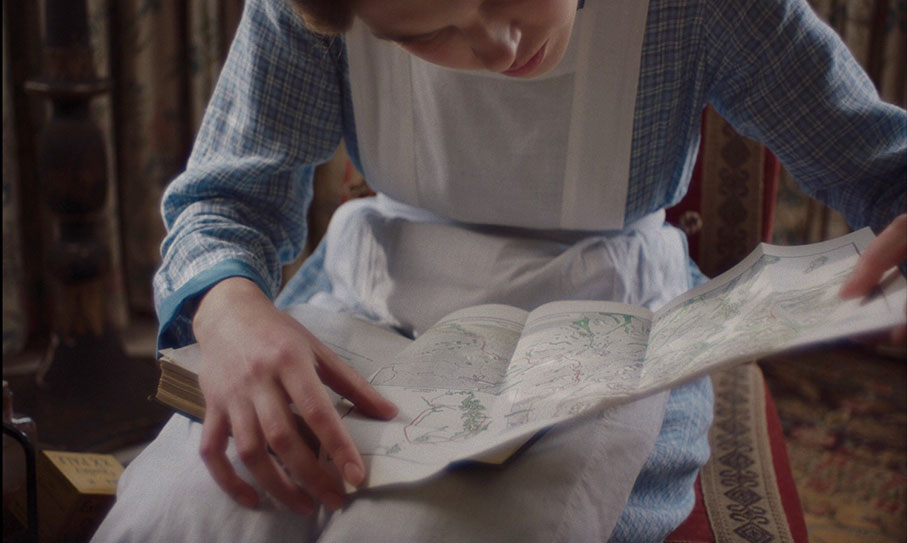| Donald: |
And when did you become a writer, Miss Jane Fairchild? […] |
| Jane: |
Three times over. The day I was born. The day Mr Paxton gave me my typewriter. |
| Donald: |
Of course. [long pause] And the third…? |
| Jane: |
That’s a secret. |
1924. Jane Fairchild (Odessa Young) was brought up as an orphan and now, in her early twenties, is a maid employed by the Nivens (Colin Farrell, Olivia Colman). It’s 30 March, Mothering Sunday, when traditionally the domestic staff are given the day off. The Nivens are going to lunch with their close friends, the Sheringhams, whose youngest son Paul (Josh O’Connor) is engaged to be married to Emma Hobday (Emma D’Arcy). Paul is studying to become a lawyer, so he is at home and will join the lunch later. However, in secret he’s having an affair with Jane, who cycles over to his otherwise unoccupied house for an assignation...
If James Joyce hadn’t already used the title after a fashion in a novel published eight years before this story was set, and which you could imagine its protagonist reading at some point, Mothering Sunday could have been called A Portrait of the Artist as a Young Woman. Mothering Sunday was Graham Swift’s tenth novel, though it’s better called a novella, at some 30,000 words by my estimate. It is centred on a particular time and place and the main action, flashbacks and flashforwards notwithstanding. Takes place over a particularly short period, namely one day. A novella is a category of short fiction rather than a novel, and Swift’s novel gains its effects by using its limited scope to expand outwards, suggesting something much larger that what there is on the surface.

There’s a case for suggesting that short fiction is ideally placed to be the basis of a feature-length film. A novel is too large, and has to be edited and if particularly long and complex is better placed as a miniseries, or a four-hour film in episodes if you prefer. But with a novella, or a short story, you can just as easily expand as cut. Ian McEwan’s Booker-nominated On Chesil Beach is another novella, a little longer than Swift’s, set mostly during its central couple’s wedding night, and it too readily saw the light of a projector lamp, back in 2018, although I have reservations over both book and film. Like Mothering Sunday, it too takes place over a short period of time.
One way Swift’s novella, and this film version (screenplay by Alice Birch, directed by Eva Husson), expands outwards is via its complex time sequence, something it shares with other films from Swift novels (Waterland in 1992, Last Orders in 1996). The events of 30 March 1924 proceed mostly in sequence, but we do have flashbacks within it, along with have flashbacks to earlier times (previous assignations and Jane and Paul’s first meeting). There are also flashforwards. A subplot, expanded by Birch from mentions in the novel, features a somewhat older Jane with a lover, Donald (Ṣọpẹ Dìrísù). Finally, after a brief glimpse early on, we have a final scene with Jane as an old woman (Glenda Jackson) looking back at the events of the story, now a long way back in the past, the day her life changed. We have flashbacks from the point of view of other characters too: Paul has some of himself as a young boy, with his two older brothers, neither of whom returned from the War. And, at the lunch, while the Nivens, Sheringhams and Hobdays wait for Paul to join them, we spend some time with Emma (Emma D’Arcy), who was originally due to marry one of the Nivens’ sons, but he didn’t return either. We also have a couple of apparitions, including one of Paul by Jane after he has left, at what, with hindsight, is a significant moment. (No spoilers.) This Nicolas Roeg-type approach to chronology, often proceeding by free association rather than by strict time sequence, isn’t that usual in mainstream commercial cinema nowadays. You do have to pay attention, but it soon falls into place. Husson and her DP Jamie Ramsay help out by varying the film’s look: 1924 is for the most part bathed in the golden hues of a glorious spring day, while the sequences of Jane and Donald a few years later are cooler and more autumnal, notwithstanding the fact that Odessa Young has a hairstyle and makeup intended to make her look older.

Jane grew up in an orphanage. When Paul asks her about her name, she said that there were a lot of Janes there, and her surname wasn’t unusual either – Fairchild, in amongst all those Goodchilds and Goodbodys. Clearly nothing much is expected of her, other than to do her job as a maid. Yet, there’s a potential in her that some see: Mr Niven, coming across her reading a book from the house library while she was meant to be doing her work, simply leaves her to it. That leads us to the scene which is at the centre of the story. After Paul leaves for his lunch date, Jane has a few hours left before she needs to return home. With no dialogue, Birch and Husson show her walking through this house she doesn’t own and doesn’t work in, after her liaison that no one knows about, reading books from a library that isn’t hers, eating a pie and drinking a beer left behind in the kitchen, while stark naked all this time. It’s a transgressive moment, and a key one in her artistic evolution. A few years later, as Jane is working in a bookshop, which is where she meets Donald, is the second stage in her becoming a writer. How many years later isn’t specified: it’s at least four, as Virginia Woolf’s Orlando is mentioned, and that was published in 1928.
Towards the end of the film, Mrs Niven says that Jane is fortunate in being an orphan in that she was comprehensively bereaved at the outset. Mrs Niven doesn’t actually know the half of it, as we have found out. Five and a half years after the Armistice, the War still weighs heavily on the characters, from Jane’s fellow maid Milly, who lost her boyfriend before she and he even so much as kissed, to the middle-aged Nivens and Sheringhams, who lost four out of their combined progeny of five sons, Paul being the only one remaining. Emma too is mourning for the Niven son she was originally going to marry. Her forthcoming marriage to Paul has a sense of settling for second best. However, this part of the film turns on Olivia Colman’s performance as Mrs Niven. She’s not on screen that much, and says little when she is. But then, during that awkward lunch, one hour into the film, it all comes out, an explosion which in that one scene almost tears the film apart.
The biggest names in the film aren’t on screen as much: I’ve mentioned Olivia Colman and Glenda Jackson’s role is a cameo. Colin Firth has more to do, on the surface anyway, facilitating much of the plot and some of the exposition. But the film belongs to its younger actors, in particular Odessa Young. She is one of a rich crop of Australian actors under twenty-five and attracted many people’s attention six years ago in The Daughter and Looking for Grace. With a pitch-perfect accent, she gives a commanding performance which might have attracted awards attention if Mothering Sunday had had a higher profile.

The director, Eva Husson, is French. Her first film seen in the UK was 2015’s Bang Gang (A Modern Love Story). I wasn’t very enamoured with that film, but it shares with Mothering Sunday a hot-weather atmosphere and a frankness about things sexual. That extends to nudity, including full-frontals male and female both, and not flinching from the messiness of sex nor indeed the details of 1920s contraception. Jane comments that if anyone knows about any sexual goings-on in the house, it’s the maid, who has to change the sheets and wash them.
Mothering Sunday was made during a pandemic and released during one, at a time when one or two new films took a fortune and others underperformed. Sadly, this film looked like one of a long line of British heritage movies which are literary adaptations, more like sub Merchant Ivory, which it isn’t. (I’ll also point out that Merchant Ivory might have defined a particular genre of British cinema but they did so without being British themselves.) Mothering Sunday is a fine film, which hopefully can have more of its due in time.
Mothering Sunday is released on DVD and Blu-ray by Lionsgate. This is a review of the latter edition. There’s no 4K disc but the film can be streamed in that resolution. The Blu-ray region coding is unusual: B and C but not A. The film has a 15 certificate.
The film was shot digitally on an Arri Alexa Mini (which captures at 3.4K resolution), finished via a 4K digital intermediate. The Blu-ray transfer is at the intended ratio of 1.66:1, something else which aligns it more to European arthouse cinema than British heritage. As this film has been entirely digital from start to finish, you’d expect it to look pristine and it does. Ramsay’s cinematography varies its colour palette according to time and also mood, cooling things right down as bad news is received late on.
The soundtrack is available in DTS-HD MA 5.1, though the soundstage is pretty much monophonic, apart from directional effects and Morgan Kibby’s score in the surrounds. There is also an English audio-descriptive track in DTS-HD MA 2.0 and English subtitles for the hard of hearing. I watched with the latter activated and didn’t spot any errors.
The Cast on Working Together (0:57)
The Cast on Sandy Powell’s Costumes (1:45)
It has to be said that the extras on this disc aren’t up to much (we don’t even get a trailer) and most likely derive from the film’s electronic press kit. Case in point, these two brief items, which are little more than soundbites. There are some interesting snippets about Sandy Powell’s approach to costume designing (and she also briefly appears as well) but these are one-watch items.

Interview with Eva Husson (8:20)
This is a little more substantial, but doesn’t dig very deeply. It’s presented in the usual form of text-caption questions followed by Husson speaking to camera, in English. She tells us of her reaction to Graham Swift’s novella before reading Alice Birch’s script, and of her work with the cast and with Sandy Powell. Some discussion of the logistics of making a film during a pandemic and of the use of intimacy coordinators might have been interesting, but it’s not here.
Mothering Sunday was made in a pandemic and released in one, a difficult time for the cinema industry with many films falling by the wayside than possibly deserved to. This is certainly one of them, a finely made and acted version of Graham Swift’s novel.
|